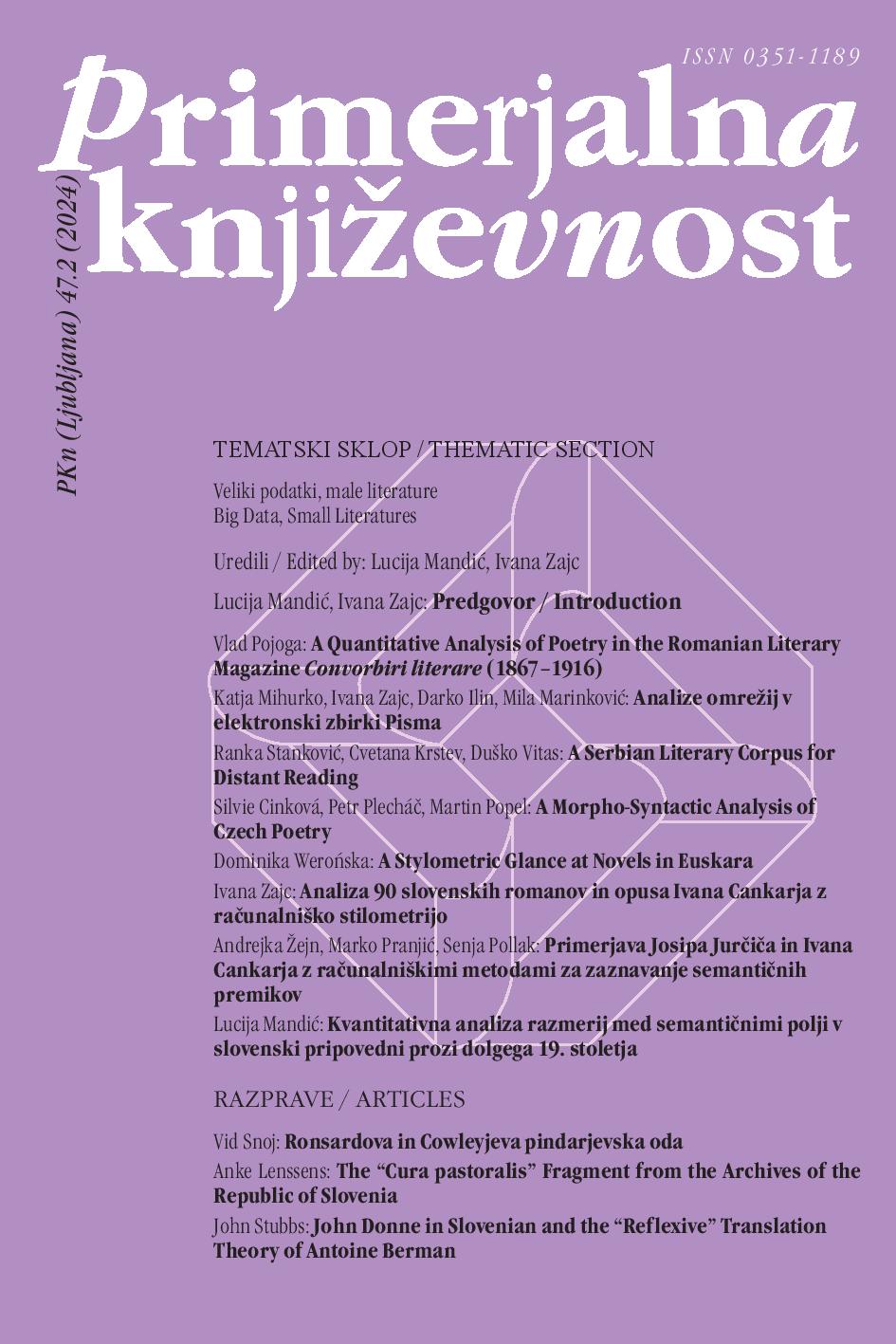Ronsard’s and Cowley’s Pindaric Ode
DOI:
https://doi.org/10.3986/pkn.v47.i2.09Keywords:
ancient Greek poetry, Pindar, literary reception, Pindaric ode, Horace, Ronsard, Pierre de, Cowley, AbrahamAbstract
After his return to the West, which had been separated from Greek culture by the language barrier after the end of antiquity, Pindar regained the status of “champion of the lyricists” that he had enjoyed with the Greeks. In the late Renaissance, the highest genre of lyric became the ode, as the epinician was also already called by Alexandrian scholars, and Pindar’s epinician with its triadic stanzaic structure was established as its prime example. The poem in which Horace depicted Pindar as a wild mountain river and gave him the image of a metrical wild man also had a decisive influence on the reception of Pindar’s poetry. In the vulgar language, Pierre de Ronsard made prominent the Pindaric ode with a triadic structure and thus earned himself a lasting place in French and European literary history. He became known as the French Pindar. Pindaric odes began to be written after the Ronsard’s model, without first-hand knowledge of Pindar, and Ronsard’s ode reached England. The milestone in English pindarising, however, is Abraham Cowley’s “Pindarique Odes”, which are characterized by loose metrics and the freedom of leaping thought. By translating Pindar and poeticizing after Pindar’s “enthusiastic manner”, Cowley triggered a fashion for irregular Pindaric odes among his compatriots, a fashion that was curbed after a while by William Congreve’s diametrically opposed image of the great Greek lyricist. In it, Pindar appears as a purely regular poet whose metrics correspond to the coherence of his thoughts.
References
Bowra, Cecil M. Pindar. Clarendon Press, 1964.
Callimachus. Hecale / Hymns / Epigrams. Loeb 129, grški izvirnik z angleškim prevodom, Harvard University Press, 2022.
Congreve, William. »A Discourse on the Pindarique Ode«. Complete Works, Delphi, 2018, str. 144–148.
Cowley, Abraham. Poems: Miscellanies, The Mistress, Pindarique Odes, Davideis, Verses Written on Several Occasions, izd. A. R. Waller, Cambridge University Press, 1905.
Curtius, Ernst Robert. Evropska literatura in latinski srednji vek. Prevod Tomo Virk, LUD Literatura, 2002.
D'Angour, Armand. »Horace’s ‘Victory Odes’: Artifices of Praise«. Bulletin of the Institute of Classical Studies, Supplement, let. 112, 2012, str. 57–71.
Dionysius of Halicarnassus. Critical Essays I: On Literary Composition. Loeb 466, grški izvirnik z angleškim prevodom, Harvard University Press, 2007.
Du Bellay, Joachim. Œuvres complètes: La défense & illustration de la langue françoise suivi de l’Olive et quelques autres œuvres poétiques. Zv. 1, izd. Léon Séché, Revue de la Renaissance, 1903.
Dryden, John. »Preface Concerning Ovid’s Epistles«. Complete Works, Delphi, 2013, str. 1006–1016.
Fitzgerald, William. Agonistic Poetry: The Pindaric Mode in Pindar, Horace, Hölderlin, and the English Ode. University of California Press, 1987.
Freis, Richard. »The Catalogue of Pindaric Genres in Horace ‘Ode’ 4.2«. Classical Antiquity, let. 2, št. 1, 1983, str. 27–36.
Gasparov, Mihail Leonovič. Očerk istorii evropejskogo stiha. 2. izd., Fortuna Limited, 2003.
Graf, Fritz. Apollo. Routledge, 2008.
Hamilton, John T. Soliciting Darkness: Pindar, Obscurity, and the Classical Tradition. Harvard University Press, 2003.
Highet, Gilbert. The Classical Tradition: Greek and Roman Influences on Western Literature. Oxford University Press, 2015.
Horace. Odes and Epodes. Loeb 33, latinski izvirnik z angleškim prevodom, Harvard University Press, 2004.
Horace. Satires. Epistles. The Art of Poetry. Loeb 194, latinski izvirnik z angleškim prevodom, Harvard University Press, 1989.
Irigoin, Jean. Histoire du texte de Pindar. C. Klincksieck, 1952.
Johnson, Samuel. The Lives of the English Poets. Zv. 1, izd. Roger Lonsdale, Oxford University Press, 2006.
Jonson, Ben. The Workes of Benjamin Jonson. Zv. 2, Meighen 1640.
Krummacher, Hans-Henrik. Lyra. Studien zur Theorie und Geschichte der Lyrik vom 16. bis zum 19. Jahrhundert. Walter de Gruyter, 2013.
Milton, John. Complete Shorter Poems. Izd. Stella P. Revard, Willey-Blackwell, 2009.
Minturnus, Antonius Sebastianus. De poeta, ad Hectorem Pignatellum, Vibonensium Ducem, Libri sex. Apud Franciscum Rampazetum, 1559.
Moffitt, John F. Inspiration: Bacchus and the Cultural History of a Creation Myth. Brill, 2005.
Ovidij Naso, Publij. Metamorfoze. Izbor. Prevod Kajetan Gantar, Mladinska knjiga, 1977.
Quintilian. The Orator’s Education. Loeb 126, latinski izvirnik z angleškim prevodom, Harvard University Press, 2001. (Slovenski prevod: Šola govorništva. Prevod Matjaž Babič, Šola retorike Zupančič&Zupančič, 2015.)
Platon. Zbrana dela. Zv. 1, prevod Gorazd Kocijančič, Mohorjeva družba, 2004.
Revard, Stella P. Pindar and the Renaissance Hymn-Ode: 1450–1700. Arizona Center for Medieval and Renaissance Studies, 2001.
Ronsard, Pierre de. Œuvres complètes. Zv. 2, izd. Prosper Blanchemain, P. Jannet, 1857.
Schmid, Erasmus, izd. Pindarou Periodos, hoc est Pindari Olympionikai, Pythionikai, Nemeonikai, Isthmionikai. Wittenberg, 1616.
Schmitz, Thomas. Pindar in der französischen Renaissance. Studien zu seiner Rezeption in Philologie, Dichtungsstheorie und Dichtung. Vandenhoeck & Ruprecht, 1993.
Senegačnik, Brane, prev. Slavospevi in izbrani fragmenti, Pindar, Družina, 2013.
Snell, Bruno, in Herwig Maehler, izd. Pindari carmina cum fragmentis. Epinicia. Zv. 1, B. G. Teubner, 1980.
Snell, Bruno, in Herwig Maehler, izd. Pindari carmina cum fragmentis. Fragmenta. Indices. Zv. 2, B. G. Teubner, 1975.
Wilson, Penelope. »Pindar and English Eighteenth-Century Poetry«. Bulletin of the Institute of Classical Studies, Supplement, let. 112, 2012, str. 157–168.


